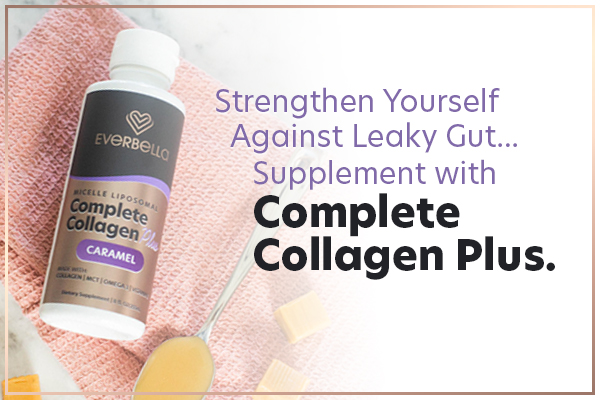Author: everbella
The 8 B Vitamins
Did you know that there are eight B vitamins, all of them with their own unique name and function? They’re all also essential, meaning your body needs them in order to function properly.
Below, I’m going to share with you the eight B vitamins, as well as their function, and how they can help you!
The 8 B vitamins
B vitamins are water-soluble and largely absorbed in the intestinal tract. Any excess is simply passed through the body, so no negative side-effects come from consuming large amounts. This also means that these vitamins must be consumed regularly, as the body does not store them.
Now, let’s take a look at what these vitamins do:
Vitamin B1 – Thiamine
Vitamin B1, or thiamine, was the first B vitamin to be discovered, hence the name. Its primary function is to help the body turn food into energy. The body uses it to make adenosine triphosphate (ATP), a molecule that transports energy within the cells.
If you do not have enough vitamin B1 this process cannot work properly. You may have symptoms such as tiredness, loss of appetite, and muscle weakness.

Vitamin B2 – Riboflavin
If you’ve ever consumed foods with riboflavin, or taken it as a supplement, you might have noticed that your pee is especially yellow. This is due to vitamin B2 and its natural yellow color. But besides yellowing your pee, vitamin B2 plays a role in breaking down carbohydrates, proteins, and fats to produce energy.
Riboflavin deficiency can cause skin disorders, sores at the corners of your mouth, swollen and cracked lips, hair loss, sore throat, liver disorders, and problems with your reproductive and nervous systems. So make sure you’re getting your vitamin B2!
Vitamin B3 – Niacin
Vitamin B3 boasts many health benefits while also helping the body convert food into energy. It is a major component of the coenzymes involved in cellular metabolism. Additionally, niacin acts as an antioxidant and contributes to making and repairing DNA.
A severe niacin deficiency leads to pellagra, a condition that causes a dark, sometimes scaly rash to develop on skin areas exposed to sunlight; bright redness of the tongue; and constipation/diarrhea. Other signs of severe niacin deficiency include depression, headache, fatigue, memory loss, and even hallucinations.
Vitamin B5 – Pantothenic Acid
Like all B vitamins, B5 contributes to metabolism, turning the food you eat into energy. On top of that, pantothenic acid helps create red blood cells, sex hormones, and stress hormones.
Though pantothenic acid deficiency is rare in the United States, it can happen. Severe deficiency can cause numbness and burning of the hands and feet, headache, extreme tiredness, irritability, restlessness, sleeping problems, stomach pain, heartburn, diarrhea, nausea, vomiting, and loss of appetite.
Vitamin B6 – Pyridoxine
Along with its function of metabolizing protein and glucose, vitamin B6 is involved in keeping the lymph nodes, thymus, and spleen healthy. It helps create hemoglobin, a component of red blood cells. Pyridoxine is also thought to support brain health.
Vitamin B6 deficiency may cause seizures, mental status changes, anemia, itchy skin, dry lips, swollen tongue, and depression.

Vitamin B7 – Biotin
Also known as vitamin H, biotin stimulates keratin production in hair and can increase the rate of follicle growth. The word “biotin” comes from the ancient Greek word “biotos,” which means “life” or “sustenance.” Biotin helps keep your skin, hair, eyes, liver, and nervous system healthy. Biotin is also a crucial nutrient during pregnancy, as it’s important for embryonic growth.
Symptoms of low biotin include hair loss, dry scaly skin, cracking in the corners of the mouth, swollen and painful tongue that is magenta in color, dry eyes, loss of appetite, fatigue, insomnia, and depression.
Vitamin B9 – Folate
Folate is another contributor to the creation and maintenance of DNA and other genetic material. It also helps in the process of cell division – a necessary part of the cell cycle.
Common symptoms of folate deficiency can include fatigue, lethargy, and muscle weakness. There may also be neurological signs, such as a feeling of pins and needles, tingling, burning, or peripheral neuropathy, i.e. a numbness in the extremities.
Vitamin B12 – Cobalamin
Cobalamin is a complex vitamin that has been heavily researched and is notable for an array of health benefits. The vitamin is crucial for human health, with prolonged deficiency having potentially permanent consequences. It plays an important role in brain function and the nervous system. It is also critical in the formation of red blood cells, along with regulating and creating DNA.
Not getting enough vitamin B12 to the point of a deficiency can cause a variety of serious symptoms including brain fog, depression, joint pain, and fatigue.
Now you know all 8!
You also now know just how important these seemingly boring nutrients are for your health. When you’re too low on them, you can run into many health issues. Sure, vitamin C and other nutrients may take the limelight, but the B vitamins are just as important!

I knew that for biotin, which is why I made Complete Biotin Plus. I had found myself to be WAY too low in biotin, which had been causing me all sorts of issues, such as poor hair growth, dry skin, and constant fatigue.
Thankfully, after taking Complete Biotin Plus, I feel MUCH better.
You can too if you think you may be low!
>>> Click here to learn more about Complete Biotin Plus and how it can help you
6 Natural Ways To Ease Eczema

Did you know that infants are prone to eczema, and that 10% to 20% will have it? It’s true! However, nearly half of all infants diagnosed with eczema outgrow the condition or have significant improvement as they get older.
But that doesn’t mean everyone becomes eczema-free with age. In fact, eczema is fairly common and affects more than 31 million Americans.
But if you’re unfamiliar with eczema, you may be wondering…
What is eczema?
Eczema is a skin condition characterized by inflammation, redness, and itchiness. There are different types of the condition, with the most common being atopic dermatitis or atopic eczema. If you develop eczema, your skin will become chronically dry, sore, and maybe even cracked. It occurs most often on the hands, back of knees, inside the elbows, on the face, or on the scalp, but it can appear anywhere on the body.
What causes eczema?
Eczema occurs when the function of the skin barrier becomes compromised, allowing hydration to escape your skin. Called the “natural moisture factor”, this barrier can be damaged by several things, including:
- Harsh skincare products
- Exfoliating too often or too rigorously
- Harsh peels
- UV damage
- Low-fat diets
- Stress
If you have eczema or are looking to avoid it, be sure to use gentle skincare products, avoid perfumed products, eat a healthy diet, and do your best to avoid stress so you don’t trigger a breakout.
Certain foods are also associated with eczema breakouts. Most are considered common allergens and include:
- Cow’s milk
- Eggs
- Gluten
- Nuts
- Fish
- Shellfish
- Soy
- Tomatoes
- Citrus
- Various spices
If you have eczema or are worried you do, an elimination diet of the above – cutting out each food one by one until you see a change in your condition – can help you determine which food(s) to avoid.
But if you’re looking for additional relief, thankfully nature has a few things to offer. Below, I’ll go over six natural ways for you to combat your eczema (or hopefully avoid it altogether).
1. Probiotics
Not many people know this, but there is a connection between the health of your gut and the health of your skin.
The gut contains a collection of trillions of strains of bacteria and microbes, called the gut microbiome. This microbiome maintains homeostasis throughout the body, but can majorly affect our other organs, especially our skin, if it becomes unbalanced. If we experience any issues with our gut, like inflammation, leaky gut, or digestion problems, our skin is usually the first place we notice problems.
When it comes to skin health, more and more studies are linking good skin to a healthy gut. Scientists have found links between gut health and skin issues, including eczema. [1]
Research has also found that those with skin issues have a higher incidence of gastrointestinal disease – and vice versa. [2, 3]
As such, maintaining the health of your gut can be crucial when it comes to maintaining healthy skin. Taking a reliable probiotic can help you achieve that by sending in more beneficial bacteria and flushing out harmful bacteria.
2. Zinc
An important mineral, zinc plays a crucial role in the health of your skin.
Many studies show that zinc intake can be beneficial for those with inflammatory skin conditions like eczema. [4]
For example, one review of 16 studies linked low levels of zinc with a higher risk of developing eczema. [5]
Another study substantiated this finding by showing that children with eczema were more likely to be deficient in zinc than those without eczema. [6]
What’s more is that one study showed that children with eczema saw a significant reduction in their condition following zinc supplementation. [7]
So, if you want to do your best to avoid eczema – and to have optimal skin health all around – consider a zinc supplement.
3. Flavonoids

Flavonoids are compounds found in plants that often give fruits and vegetables their beautiful colors, like the deep reds of berries or the vibrant orange of carrots.
Research is beginning to show that these compounds are able to alleviate the effects of inflammatory skin conditions such as eczema. [8]
This is believed to be due to their anti-inflammatory and antioxidant properties. [9]
If you’re looking to take in more flavonoids, you’ll want to increase your fruit and veggie intake. Teas are also a great source.
4. Omega-3
Eczema or no eczema, omega-3 can help minimize skin irritations by reducing inflammation in the body that leads to itching.
Omega-3 is a combination of docosahexaenoic acid (DHA) and eicosapentaenoic acid (EPA). The EPA helps “waterproof” skin cells by boosting the cell membrane. This, in turn, moisturizes the skin from the inside out.
A study in mice found that omega-3 fatty acids may help decrease markers of inflammation and reduce skin lesions caused by eczema. [10]
Additionally, a study involving pregnant women showed that consuming omega-3 rich fish oil while pregnant can help reduce the prevalence and severity of eczema in their children. [11]
5. Vitamin E
You may be aware that vitamin E is present in a lot of skin care products, and that’s for good reason.
Not only does it help protect the skin against oxidative damage, research has shown that it may help decrease symptoms of eczema. [12]
One study followed those with eczema for 4 months. Participants were split off into two groups. One group took a placebo while the other received 400 IU of vitamin E daily. The vitamin E group saw significant improvements in eczema severity and symptoms like itching, compared to the placebo group. [13]
Additionally, another study found that taking 600 IU of vitamin E per day led to a 36% reduction in eczema severity after 60 days. When combined with 1,600 IU of vitamin E every day, eczema severity dropped by 64%! [14]
6. Collagen
When it comes to proper skin health, collagen is crucial. A reliable, high-quality collagen supplement helps increase the levels of collagen within your skin, allowing it to be as strong and resilient as possible.
Collagen has preventative qualities. It plays a role in strengthening and hydrating the skin, plus glycine – one of the amino acids in collagen – is an anti‑inflammatory.
The protein may also have an antibacterial effect that fights against bacteria that live on the skin (such as staphylococcal), which have been known to cause eczema. A study done at Université Laval in Canada showed that collagen has significant antibacterial properties. [15]
Because collagen is a major component of our skin, it’s crucial to the healing process. It helps with the creation of new skin and enables skin to heal more rapidly. Collagen can decrease the signs of roughness and dryness in the skin, which are some of the most noticeable symptoms of eczema.
This is why people have found relief for their eczema with Complete Collagen Plus – one of the most reliable, highly-absorbable collagen formulas on the market.
Just take it from Jill who wrote to me a while ago and said…
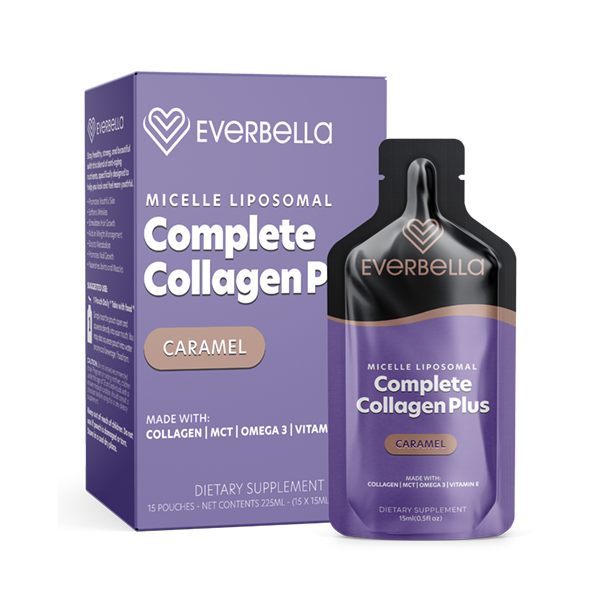
“My name is Jill. I’m a very active 67 year old. I’m a wife, a mother of four healthy professional adults, grandmother of five gorgeous grandchildren, massage therapist of 21 years, pilates and aqua aerobic instructor, and a volunteer for those visually impaired.
Eczema has been an ongoing struggle for years. Dermatologist prescribing various cortisone based topicals etc. My functional medicine doctor recommended collagen powders and pills, bone broth, and various dietary changes with nothing fully halting a trigger.
However, I’m THRILLED to report that after a month of trying your Complete Collagen Plus I have not had a flare up, plus my skin looks great – especially noted facial lines. Let’s hope I continue to experience all the benefits with continued success.”
Our team here at EverBella hears time and time again when people call to order more collagen – they RAVE about how it has helped them better manage their eczema.
If you’re looking to give your skin the best of the best, you can’t go wrong with Complete Collagen Plus. Especially since I give you 6 months to try it out!
>>> Click here to learn more about how Complete Collagen Plus can help you
Cumin, Caraway, Black Cumin, And Nigella – What’s The Difference?
You may have noticed that Complete Biotin Plus contains something called black cumin seed oil. And you may have even caught my previous article on the benefits of this seed’s oil.
If you missed it – you can click here to read it now!
This may have also caused some confusion. You see, there are other different types of seeds that are similar to black cumin seeds in name and/or appearance. These include cumin seeds, caraway seeds, black cumin seeds, and nigella seeds.
Below, I’ll go over each so you can learn a bit more about all of them, including their similarities and differences!
Let’s get started…
Cumin seeds

A first cousin to carrot and parsley, cumin seeds most resemble caraway seeds, though their name is close to black cumin seeds. Already, you can see why people get mixed up!
Cumin has been well known since ancient times, having first been cultivated in the Mediterranean and in Iran. The Romans used it as a spice and medicinal plant, while the Indians have been using it for culinary and medicinal purposes for thousands of years. So, it’s certainly a popular seed!
Whether ground into a powder or consumed whole, the seed provides a warm and earthly taste, which is why it’s commonly added to cuisines like masalas. In addition to its taste, it has natural preservative properties, so can often be found in sausages and preserved meats. In Europe, it can be found in savory pastries and pickle jars.
Medicinally, cumin seeds have plenty of uses. In Sanskrit, cumin means “that which helps digestion”. This is because cumin seeds stimulate appetite, the stomach, along with biliary and pancreatic secretion. Plus, it soothes spasms and removes gasses from the intestine.
Traditional Indian medicine boils cumin seeds in water to create a drink which is believed to prevent heart disease, swelling, vomiting, poor digestion, and chronic fever.
Many of the benefits of cumin seeds, along with its unique taste, can be attributed to the seed’s main compound called cuminaldehyde. This is an important phytochemical with many known health benefits.
Caraway seeds

Caraway seeds look quite similar to cumin seeds, though they’re a bit darker and more curved. They also have their own distinct taste, completely separate from cumin seeds. Caraway seeds have licorice and citrus notes which makes them great for teas and dishes.
Like cumin seeds, caraway has also been used since ancient times. But today, it’s commonly used in both sweet and savory dishes such as breads, pastries, curries, and stews. It’s also sometimes infused into spirits and liqueurs too!
But that’s not all. Caraway is also used as a supplement, both orally and topically.
Benefits of caraway include reducing inflammation, encouraging healthy digestion, promoting weight loss, and more!
Black cumin seeds
Black cumin is known scientifically as Bunium bulbocastanum. It’s native to Northern Africa, Southeastern Europe, and Southern Asia where its plant stands about two feet tall and is topped with white flowers.
These seeds taste like coconuts or chestnuts and are known to have many health benefits. These include being an antibacterial, anti-cancer, and anti-diabetes.

Nigella seeds
This is where a lot of the confusion sets in most. From the Nigella sativa plant, these seeds are commonly referred to as black cumin seeds. However, as you read above, black cumin seeds are technically Bunium bulbocastanum.
Because Nigella seeds have become so commonly known as black cumin seeds, it may actually become confusing to NOT call them black cumin seeds.
For thousands of years, black cumin seed oil has been used medicinally to treat a wide range of conditions. In fact, black cumin seed oil is so ancient that black cumin seeds were found in King Tut’s tomb, and they even got a mention in the Old Testament as being able to cure anything but death!
With a slightly bitter taste, these seeds offer a wide range of health benefits, including digestive health, managing weight, soothing joints, and supporting healthy skin and hair.
That last point is actually why I added Nigella to Complete Biotin Plus – just another ingredient fighting for your health and beauty!
(If you want to read more details about the benefits of Nigella seeds, click here!)
And if you want to learn what else is in Complete Biotin Plus and how they can benefit YOU, click here!
8 Skin Changes Caused By Menopause (And What You Can Do About Them)
Menopause is a normal biological process that happens to women following their last period. For most, this phase begins between ages 45 and 55. It usually lasts about seven years, but can last as long as 14 years. The duration can depend on lifestyle factors such as smoking, diet, or at which age it begins.
Among other things, menopause can bring some noticeable changes to your skin that are, unfortunately, negative. This is largely due to a plummet in collagen during this stage.
However, you can lessen the effects of these changes with the right care. Below, I’ll go over eight changes you may see in your skin through menopause, along with what you can do to help!
Whether you’re experiencing menopause, will soon, have in the past, or never will, these tips can still help you take the best care of your skin!
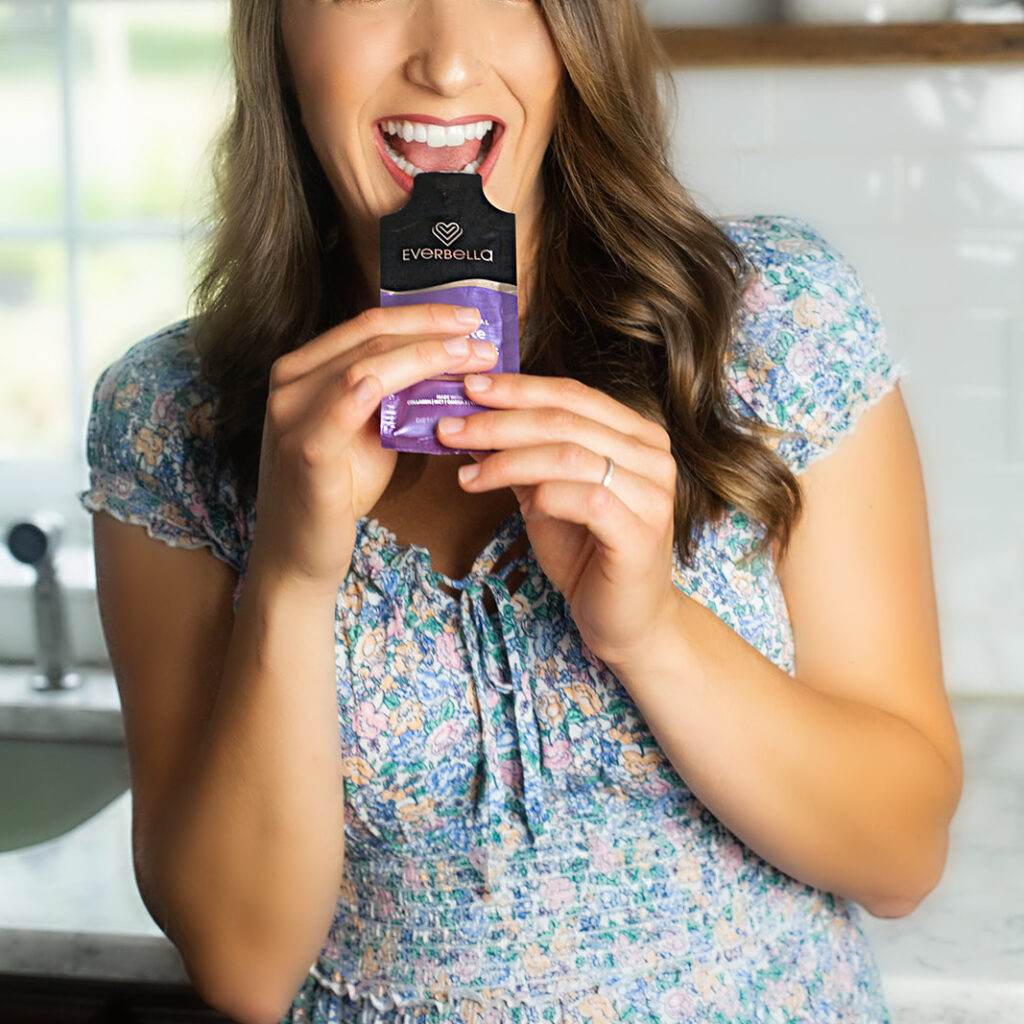
1. Age spots and sun damage
Years of sun exposure with little protection will start to show once menopause sets in. Age spots and larger areas of darker skin can appear anywhere on your body, including your face. At this time, skin cancer and pre-cancerous skin growths can also become more common.
What you can do:
- Apply sunscreen before going outdoors. This will help protect your skin from harmful UV rays when it’s at its most vulnerable. Cover anywhere that clothing won’t cover with a quality sunscreen. This can help fade age spots, prevent new spots from forming, and reduce your risk of skin cancer.
- Try home remedies. There are plenty of natural ingredients you can rub on age spots to help reduce their prevalence. These include lemon juice, potatoes, cucumbers, honey, and more.
- Get screened for skin cancer. Skin cancer is typically treatable and non life threatening if caught early. Your risk increases both with age and menopause. So be sure to get checked for skin cancer regularly if possible, and check yourself for any signs.
- See a dermatologist. If you feel your case is worse than others or you have a separate health issue that makes your age spots and UV damage more challenging, book an appointment to see a dermatologist. They’ll be able to recommend both at-home treatments and clinical procedures that can help your skin look and be at its best.
2. Bruising easily

Leading up to and during menopause, the body makes less hormones, including estrogen. This hormone is crucial in maintaining dermal health and offers many anti-aging characteristics.
As such, when menopause begins and estrogen levels drop, the skin becomes thinner and more prone to bruising.
What you can do:
- Be careful. Avoid bumping into things by arranging furniture so it’s not in the way, reducing clutter, and removing rugs or any other items that could cause tripping.
- Take stock of which medications you’re taking. Exposure to certain medications, such as long-term steroids or blood thinners, can make people more susceptible to bruising, so avoiding these might help. However, always consult with a physician prior to stopping any.
- Cover up. Wear long pants and sleeves and protective clothing to help minimize bruising, especially when you think there could be a higher chance of brusing.
- Moisturize. Moisturizing the skin can help prevent it from getting dry, which makes it more prone to breaking open.
- Apply sunscreen when necessary. Use sunscreen with an SPF greater than 30. UV damage will only make your skin thinner.
- Increase collagen. Studies show that about 30% of your collagen will be lost within just the first five years of menopause. Collagen is the protein which makes your skin strong, thick, and elastic. A quality, highly absorbable collagen such as EverBella’s Complete Collagen Plus can make a huge difference.
3. Dryness
During menopause, your skin loses some of its ability to retain water. As such, the skin can get quite dry, especially during times that are known to dry out skin, such as winter. Dry skin is more likely to crack, get bruised, and lead to infection.
What you can do:
- Wash with a mild cleanser instead of soap. For mature skin, soap can be too drying. And you definitely want to skip the deodorant bars.
- Apply moisturizer after bathing and throughout the day when your skin feels dry. It’s important to take control of your skin’s moisture by using a quality product on your skin throughout the day, and especially after showering. A moisturizer with hyaluronic acid, vitamin C, and/or glycerin can be especially helpful.
- Stay hydrated. Drinking plenty of water throughout the day is crucial in keeping your skin well hydrated. Aim for at least eight glasses a day.
- Increase your collagen intake. Collagen is well known for its ability to improve the hydration of the skin.
4. Facial hair
Due to a change in hormones, through menopause you may also notice somthing else you’ve never experienced before: facial hair. Hair under the chin, along the jawline, or above the lip are all common throughout menopause.
What can you do:
- Waxing. This may be the most simple option, however, as mentioned above, your skin may become thin during menopause and waxing can cause tearing, bleeding, and skin damage. As such, you may want to explore other options.
- See your dermatologist. A board-certified dermatologist can tell you what you can use to remove unwanted hair, since they’ll be able to best determine the state of your skin and what approach will cause the least amount of harm. Some options include laser hair removal and a prescription hair-reduction cream.
5. Jowls, slack skin, and wrinkles

As mentioned previously, your skin quickly loses its collagen throughout menopause. As collagen diminishes, our skin loses its firmness and begins to sag. Jowls appear, permanent lines run from the tip of the nose to the corners of the mouth, and wrinkles that used to appear only with a smile or frown become visible all the time.
Later, the tip of the nose dips, you may see pouches under your eyes, along with large pores. This is due to the loss of collagen which used to offer skin firmness.
What you can do:
Protect your skin from the sun. This can reduce visible wrinkles and prevent new wrinkles.
Take a collagen supplement. Your skin’s best friend is collagen. It’s literally what makes most of it up and holds it together. Maintaining healthy collagen levels is key in reducing wrinkles and sagging.
6. Pimples and acne
Not just for teenagers anymore – with menopause you may notice an increase in pimples. This is also due to a change in hormones.
What you can do:
Unfortunately, most acne creams on the market are designed for teenagers, and these will be too harsh. Because of this, you’ll have to look for other ways to reduce and treat any pimples that may arise.
- Avoid acne products that dry your skin. Drying your skin can worsen acne.
- Tea tree oil. Tea tree oil is a natural antibacterial and anti-inflammatory, which means that it might kill P. acnes, the bacteria that causes acne.
- Other home remedies. There are plenty of home remedies you can test out to see how they work for you. These include aloe vera, honey, green tea (internal or external), coconut oil, and more.
- Stay hydrated. When the skin is dry, it can become irritated or damaged, which can make acne worse. Staying hydrated also ensures new skin cells develop correctly as sores heal.
7. Rashes and easily irritated skin
Around 50, the pH level of our skin changes. With this change, skin becomes more sensitive, and women are more likely to develop rashes and easily irritated skin. If you have an existing skin condition, such as eczema or rosacea, this could worsen.
What you can do:
- Use a fragrance-free moisturizer. This can reduce irritation.
- Research how to best take care of sensitive skin. You can start doing so by reading my blog on this very subject!
Taking care of your skin
Menopause or no menopause, our collagen levels naturally deplete as we age. As you can see, this can have serious effects on the health of our skin.
Collagen can be difficult to get through food sources and most powders are next to useless due to collagen’s notoriously low absorption rate. That’s why I created Complete Collagen Plus. Not only is it designed to work thanks to a highly sophisticated, patented delivery technology, it’s made with care right here in the USA.
I want you to be able to try out Complete Collagen Plus yourself without worrying about a thing.
That’s what right now, you can try Complete Collagen Plus for 6 months. And if you find it’s not right for you – even if you’ve opened and emptied all of your bottles – simply send me back your order for a FULL refund.
I’m THAT confident that you’ll notice a difference with Complete Collagen Plus.
Are you ready to see what that difference is?
Click here to see for yourself!
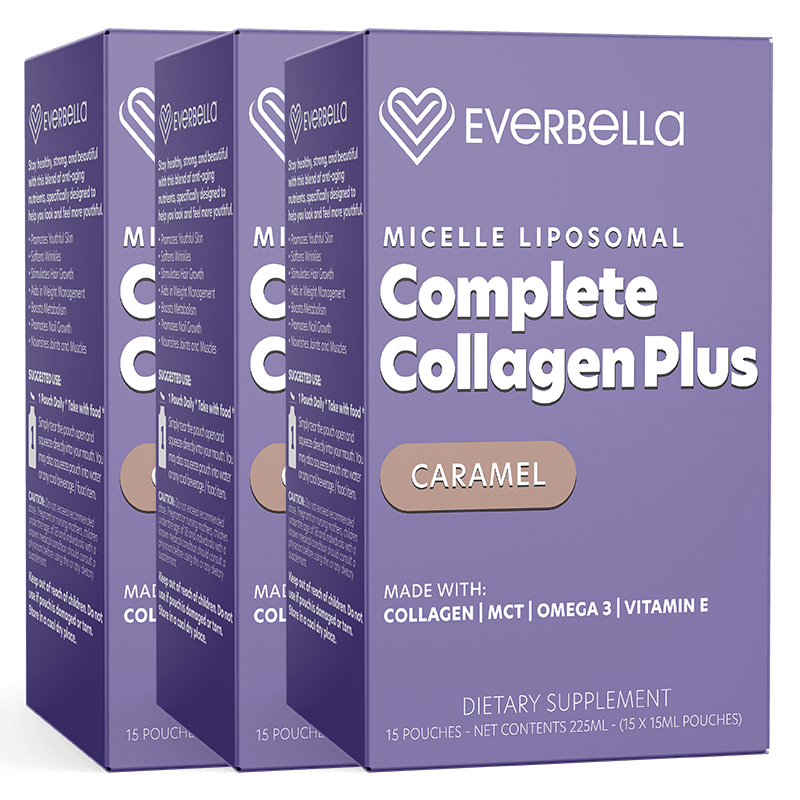
What Is Black Cumin Seed Oil (And What Are Its Benefits?)
You may have just recently heard of black cumin oil. But this isn’t because it’s new – far from it. It’s because black cumin seed oil is making headlines for its many impressive health benefits.
If you want to learn exactly what black cumin seed oil is and how it can benefit your health, just keep on reading!
What is black cumin seed oil?
Black cumin seed oil – also known as black seed oil, kalonji oil, or nigella sativa oil – is an amber-colored oil extracted from tiny black seeds of the flowering Nigella sativa plant that originated in Southwest Asia and has been used throughout the Middle East, Africa, and Eastern Europe.
For thousands of years, black cumin seed oil has been used medicinally to treat a wide range of conditions.
In fact, black cumin seed oil is so ancient that black cumin seeds were found in King Tut’s tomb, and they even got a mention in the Old Testament as being able to cure anything but death!
But what makes the oil of these seeds so great in the first place?
Well, for starters, it contains omega-3, -6, and -9 essential fatty acids, along with cholesterol-lowering plant compounds called phytosterols. Though, the source of its impressive benefits is often attributed to a particularly potent active compound called thymoquinone (TQ), which is a powerful antioxidant with anti-inflammatory, anti-allergy, and immune supporting properties.
So, what kind of benefits can you expect from black cumin seed oil? Just keep reading to find out!
6 benefits of black cumin seed oil
In recent years, there have been quite a few studies done on this oil with some interesting findings. Below are the top 6 benefits to look forward to when taking black cumin seed oil.
1. Supports digestive health
Black cumin seed oil has been used for quite some time to promote overall digestive health. In fact, it’s one of its oldest traditional uses, with tinctures of the seeds being used for indigestion, bloating, loss of appetite, and diarrhea. [1]
In addition, studies have found that black cumin seed oil helped prevent the formation of gastric ulcers in rats. Researchers believe that this is due to the gastroprotective effects of thymoquinone, which has been shown to inhibit acid secretion and help maintain the layer of mucus that lines and protects the gut. [2]
2. Supports the endocannabinoid system
The endocannabinoid system (ECS) is the body’s “master regulatory system”. The ECS comprises a vast network of chemical signals and cellular receptors that are densely packed throughout our brains and bodies. It modulates several of our most critical bodily functions such as learning and memory, emotional processing, sleep, temperature control, pain control, inflammatory and immune responses, and eating.
Due to its phytocannabinoid content, the ECS can benefit from black cumin seed oil. Phytocannabinoids are beneficial plant compounds found in black cumin seed oil, hemp, hops, rosemary, and more. [3]
Specifically, black cumin seed oil contains a key phytocannabinoid called beta-caryophyllene (BCP). BCP binds exclusively to the CB2 cannabinoid receptor. This receptor dominates the peripheral nervous system, immune system, gut, liver, skin, and bones – so supporting it is important to maintaining optimal health in these systems. [4]

3. Promotes healthy skin and hair
Cleopatra, queen of Egypt known not just for her power, but her beauty, is said to have had a secret to her appeal – black cumin seed oil.
While it would be difficult – if not impossible – to fully prove this anecdote, thanks to modern research, it wouldn’t be surprising to find out that it’s true.
A 2015 review of studies found that black seed oil intake can significantly and positively affect acne after just two months, thanks to its anti-inflammatory properties. [5]
Other research has found that topical application of black seed oil speeds wound healing, which may help reduce blemishes and scarring. [6]
4. Aids in weight maintenance
If you’re looking to lose weight, black cumin seed oil can help. It’s not a magic bullet, but it can certainly provide some assistance.
For example, one eight-week study looked at women who were following a calorie-restricted diet. They were sectioned off into two groups, with one taking a daily dose of black cumin seed oil and the other taking a placebo. By the end, the black seed oil group experienced greater reductions in weight and waist circumference. [7]
If you’re on a routine to lose weight, adding black cumin seed oil into the mix can help you see faster results.
5. Fights seasonal allergies
Allergies can sneak up on you and be incredibly annoying. Right now, the season is changing, and maybe some things either inside or outside are giving you a tough time. Well, the good news is that black cumin seed oil can help!
In one randomized, controlled study, patients with hay fever were given black cumin seed oil on a daily basis. They experienced a positive impact on nasal congestion, nasal itching, runny nose, and sneezing attacks just within the first two weeks. [8]
These results are likely due to the fact that thymoquinone acts as an antihistamine.
6. Soothes aching joints
More and more studies keep being carried out to fully grasp the potential of black cumin seed oil. Another area that has been looked at is joint health.
In one study from 2011, women who were given a dose of black cumin seed oil twice per day experienced a positive impact on swollen joints and morning joint stiffness. [9]
A more recent study found that women who took black cumin seed oil had lower inflammatory markers – ones that typically inflamed the joints. [10]
How to get black cumin seed oil?
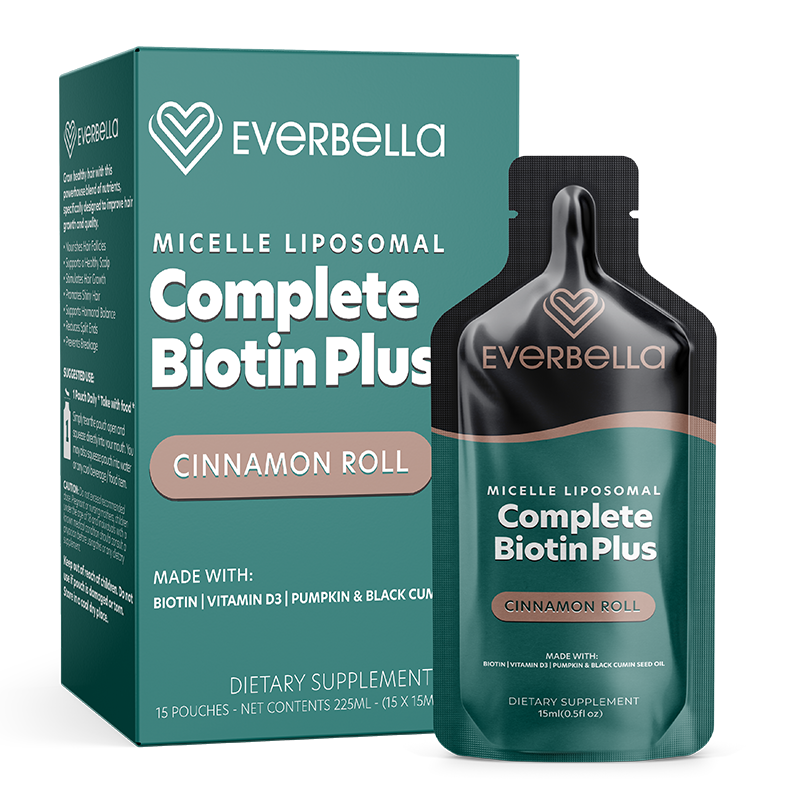
If you’re looking for a reliable, highly-absorbable form of black cumin seed oil so that you can soak in these benefits, I have just the thing.
See, the “Plus” stands for the other added compounds that are important for not just the health of your hair and skin, but your entire body! And one of these compounds is black cumin seed oil.
As always, it’s infused with EverBella’s patented micelle liposomal formula. This means that you can be confident that you’re getting the most black cumin seed oil out of every dose!
Support your health and beauty the same way Cleopatra did!
>>> Click here to learn more
The Benefits Of Collagen For Gut Health
When you think of collagen, you’re probably picturing smooth, firm, plump, and youthful skin. Or maybe it evokes the feeling of long, thick, strong hair. If you’ve been taking it for a while, it could also make you think of healthy, capable joints.
None of these are wrong.
This is because these are all common, well-known benefits of collagen. But there is something else that collagen can help with. One you probably didn’t think of right away, or wouldn’t have thought of at all!
As the most abundant protein in the human body, the health benefits of collagen extend to our bones, joints, connective tissues, ligaments, muscles, nails, and hair. It’s the glue that holds our body together and keeps it strong, healthy, and vital. But what else is this collagen doing for us that we may not even be aware of?
Collagen and the gut
Our gut is integral in determining the state of our immune health, metabolism, skin, brain health, and overall well-being. Maintaining a healthy gut is of the utmost importance. When we neglect our gut, we leave it – and ourselves – vulnerable to pathogens, infection, inflammation, and a range of digestive issues, like leaky gut syndrome.
Also known as intestinal permeability, leaky gut is a condition where the integrity of the intestinal wall has been compromised and, as a result, the immune system has been triggered. When the tight tissue of the gut wall becomes loose or “leaky”, endotoxins that are typically processed and eliminated are able to escape and be reabsorbed into the bloodstream. This triggers the immune system and causes a large influx in inflammation.
While many things can help support a leaky gut, collagen is a great way to ensure that our digestive system functions at an optimal level and avoids this issue.
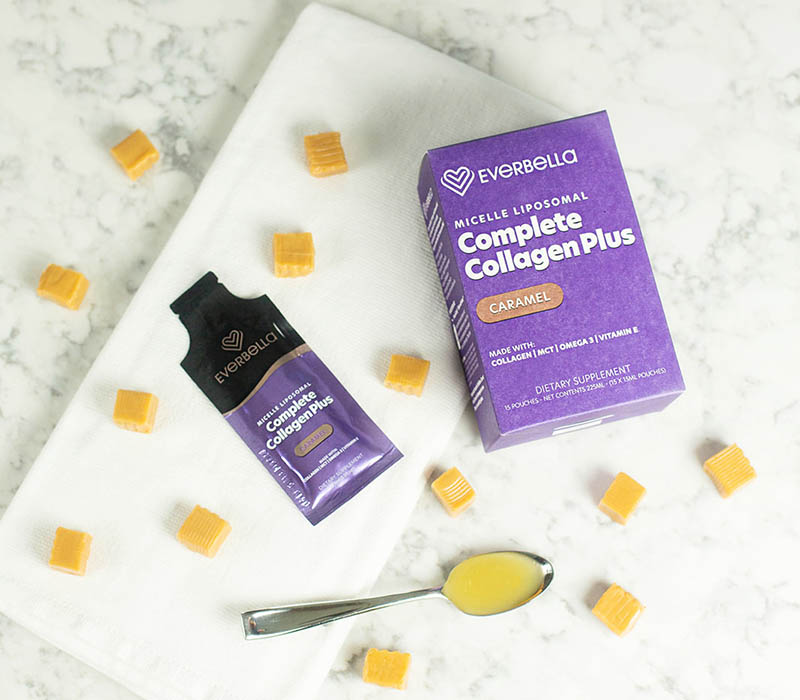
How collagen soothes, repairs, and strengthens the gut lining

Collagen doesn’t just keep the cells of your skin strong and healthy. It supports the tissue of every organ in your body, including your gut. Collagen plays an integral role in rebuilding and strengthening the lining of our digestive tract as it contains the amino acids that are essential for its repair.
Research shows that collagen peptides can actually ameliorate gut barrier dysfunction and improve its tight junctions. [1]
A 2020 animal study also found an interesting correlation between a diet rich in collagen peptides and an altered microbiota with increased short-chain fatty acid production. Given that short-chain fatty acids carry powerful anti-inflammatory and immunomodulatory benefits, this is a promising new area of research. [2]
Additionally, since gut inflammation is linked to inflammation elsewhere in the body, it’s undoubtedly beneficial to include an abundance of amino acid-rich compounds – like collagen – in our diet to help keep gut inflammation and overall inflammation at bay.
Collagen aids in digestion and nutrient absorption
When we experience digestive issues such as leaky gut, we are also at risk of impaired nutrient absorption as nutrients that would otherwise be properly absorbed in a healthy gut are instead able to escape through the intestinal lining. Since collagen can help support the integrity of the gut wall, it can mitigate the loss of nutrients from impaired gut function.
Collagen synthesis
As we age, our body’s ability to naturally produce collagen declines, so we must ensure we consume enough of the amino acids required to build, store, and synthesize collagen. But if you’re experiencing stomach issues, you may not be able to even properly bring in the amino acids that have the power to rebuild your gut’s health.
The good news is that EverBella’s Micelle Liposomal Complete Collagen Plus is designed to bypass these troubles, getting delivered directly to the bloodstream so that it can get to where it’s needed most in your body. Whether that’s the gut, your skin, or your joints, you can feel confident that you’re getting a full and pure dose of collagen with Complete Collagen Plus.

